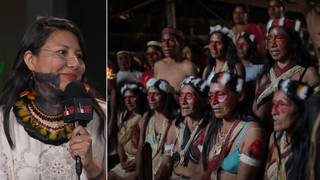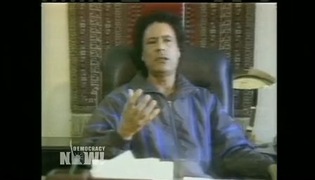
Guests
- Mohammed Nabbouscitizen journalist based in Benghazi, Libya. He was killed by gunfire while covering the pro-democracy battle against forces loyal to Col. Muammar Gaddafi on March 19, 2011.
- Anjali KamatDemocracy Now! correspondent reporting from Libya and Egypt.
A coalition of forces from the United States, U.K. and France launched air strikes against Libya over the weekend after the U.N. Security Council on Friday approved a no-fly zone. On Saturday morning, Mohammed Nabbous, a Libyan citizen journalist in Benghazi, was shot and killed. Nabbous established Libya AlHurra TV to broadcast online live feeds and commentary from the popular uprising that began last month. Described as the face of citizen journalism in Libya, Nabbous was killed while reporting on attacks by pro-Gaddafi forces. We play a clip of his final report and an excerpt of an emotional message from his wife urging people to continue to fight for democracy in Libya. Democracy Now! correspondent Anjali Kamat interviewed Nabbous last month at the media center he helped to build. [includes rush transcript]
Transcript
AMY GOODMAN: A coalition of forces with the United States, U.K., France launched air strikes against Libya over the weekend after the U.N. Security Council Friday approved a no-fly zone.
On Saturday morning, Mohammed Nabbous, a Libyan citizen journalist in Benghazi, was shot and killed. Nabbous, known as “Mo,” established Libya AlHurra TV to broadcast online live feeds and commentary from the uprising that began last month. Described as the face of citizen journalism in Libya, Nabbous was killed while reporting on attacks by pro-Gaddafi forces.
This is a clip from his last report from Benghazi. You can hardly make out what he’s saying, but you do hear the intense gunfire.
MOHAMMED NABBOUS: We are actually inside of the shooting right now. [inaudible]
AMY GOODMAN: With that, the radio broadcast went dead. Mohammed Nabbous had been killed.
In an emotional message on Mo’s AlHurra TV this weekend, his wife, Perdita Nabbous, announced his death and appealed to the pro-democracy movement to continue his work.
PERDITA NABBOUS: I’m Mo’s wife, and I want to let all of you know that Mohammed has passed away for this cause. He died for this cause, and let’s hope that Libya will become free. And let’s not stop doing what we are doing, until this is over. What he started has got to go on, no matter what happens.
AMY GOODMAN: Last month, Democracy Now! correspondent Anjali Kamat spoke to Mohammed Nabbous when she was in Benghazi at the media center there about his involvement in the anti-government protests.
MOHAMMED NABBOUS: I am Mohammed Mustafa Nabbous from Benghazi, Libya.
ANJALI KAMAT: Mohammed, describe what your role has been in this revolution.
MOHAMMED NABBOUS: I don’t know exactly, but I think what was important, I have done, was on the first day, on the 17th, when we had — or the 18th, I don’t remember anymore — on the corniche, on the opposite side of the court, we had a setup like this one but with a minimum, you know, equipment, that we just tried to deliver our voices to the outside world, when I talked to the CNN live.
ANJALI KAMAT: Well, talk about how you’re getting information out. I’m hearing that you have set up a two way internet system. How do you get through Gaddafi’s internet blocking?
MOHAMMED NABBOUS: It’s not through internet of the Gaddafi. It’s actually a separate, independent internet that is connected to the satellite. And from the satellite, it’s on the dish, and from the dish to the satellite, it’s immediately to the outside world
ANJALI KAMAT: And have you had experience doing this before?
MOHAMMED NABBOUS: Yes, I worked as an ISP, internet service provider, for about three, four years before, and that’s how I got my experience to set up everything in here. But I have got help even from other people who are trying to help by anyhow they can, by equipment, by — you know, by services. I mean, they opened the service from the outside, from the inside
ANJALI KAMAT: This is a two-part question, alright? One, did you expect this to happen so quickly — right? — the fall of Benghazi, to be free of Gaddafi’s forces? And what —- you know, what did you do leading up to February 17th, to participate in the initial call for the demonstration, and leading up to that? What were the different -—
MOHAMMED NABBOUS: Let’s start, question by question.
ANJALI KAMAT: Yeah.
MOHAMMED NABBOUS: The first question was about if it’s going to fall sooner or later. It was falling every day. And it was obvious that it was falling every day, because we never stopped. At night, people would just go out and keep pressure on the army, the private forces and everybody. And in the morning, all, everyone would, you know, protest against the system. People were dying, yes, but they were dying for a good cause, and they will never be forgotten. And if you look outside of here, you will see a picture of everyone that has actually been killed in these protests.
So, the second question you have asked, how — how did I…?
ANJALI KAMAT: How did you get involved? Like, talk about putting the call out for February 17th. And you said you were involved even before that, right?
MOHAMMED NABBOUS: Yes, on the Facebook and on other websites, like Twitter, like — you know, I was just trying to send as many information as I can to encourage people to go on the 17th. But, fortunately, it happened even before the 17th. It happened on the 15th, and I was so happy to go on the streets. I was trying to find these protesters, but the first day we couldn’t find anyone. So, the second day, we found some people, and we started protesting, but it wasn’t that serious. The third day, it was really serious, and the fourth day it was really serious. And then, we just, you know, joined our brothers and sisters down here in front of the court, and we started getting united and just, you know, telling people what we want, telling what we had to say. We started chanting and writing signs and just doing all of what we can do.
ANJALI KAMAT: What inspired you to get involved with the 17th demonstration?
MOHAMMED NABBOUS: The system. I mean, me, myself, I wasn’t actually damaged by the system that much, but other peoples are really suffering from this system, so it’s not fair. Not because I am — I am happily, I mean, living a normal life, that means everybody else is. I mean, even some people were telling me, “Why are you on the streets? Why are you demonstrating? You have nothing to complain. You have everything. Why are you here?” I was like, “It doesn’t matter. I mean, there are other people that I can see they are suffering, and they need more. And if my country is better, I’m going to be even better.”
AMY GOODMAN: Mohammed Nabbous was killed on Saturday as he was broadcasting live on the air during Gaddafi’s assault on Benghazi. You can hear Anjali’s full interview with Mo on our website at democracynow.org, when she was in Syria with him at the media center.












Media Options